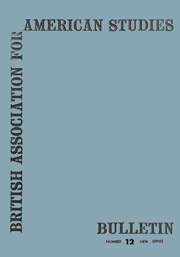No CrossRef data available.
Article contents
The Democratic Ideas of James Wilson: a Reappraisal
Published online by Cambridge University Press: 17 February 2011
Extract
“The services which such a mind as Wilson's, broad, penetrating, exact and luminous can render to a nation can hardly be overestimated… Whoever gives a nation, and most of all to a nation at the outset of its career, sound just principles for the conduct of its government, principles which are in harmony with its character and are capable of progressive expansion as it expands, is a true benefactor to that nation, and deserves to be held in everlasting memory. Such a one was James Wilson.” Lord Bryce's eulogy of Wilson, conceived in the light of liberal democratic ideas, is echoed at many points by a recent biographer, who emphasises Wilson's contribution to American democratic thought and practice. It is regarded with suspicion by those who believe that Wilson could not have been a sincere democrat, and that he used democratic concepts as a device merely to achieve other purposes. “The difficulty with the picture of Wilson as a democrat,” writes one critic, “is his career in Pennsylvania politics,” and he goes on to suggest that Wilson exploited democratic concepts in order to bring about the dominance of the central government.
- Type
- Research Article
- Information
- Copyright
- Copyright © British Association for American Studies 1965


